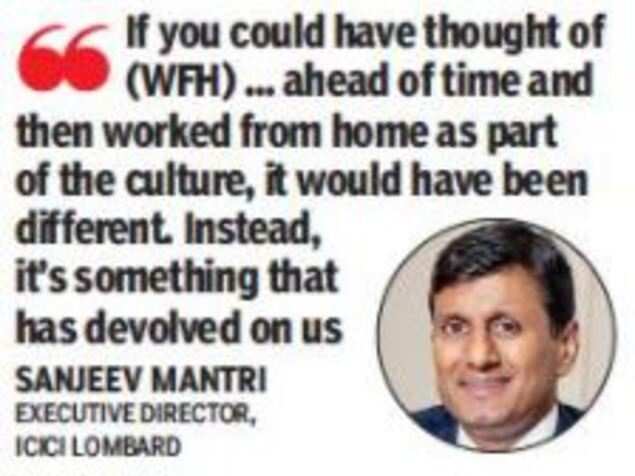You can’t wish away pressure; time to become more resilient | India News – Times of India
In 2019, the India Wellness Index by ICICI Lombard found Indians had a wellness index score of 78, which fell sharply over the past year and is now down to 66. On March 5, as part of the Get Well-thy India initiative, a panel of experts from a wide range of fields, discussed this downward trend and how to reverse it.
“The index score falling from 78 to 66 somehow doesn’t even cover the total pain that we as a country have gone through,” said Sanjeev Mantri, executive director of ICICI Lombard, who admits a holistic approach to wellness was needed well before the pandemic. “Physical aspect of wellness is well understood but there are a lot of softer aspects, be it mental, family or workplace,” he added.
The meaning of wellness is changing, particularly in the workplace, and isn’t limited to physical health and finances, says Abhishek Ganguly, managing director of Puma India and Southeast Asia. “It’s as much about being mentally happy as it is about being physically healthy. As a professional, I have seen organisations that engage with employees on wellness, both mental and physical, are far happier,” he said.

Ganguly said creating a workplace culture built on empathy is crucial, especially in tough times. “The easiest thing, when you’re under pressure to manage cash, is to let people go and that’s wrong. The people who got you to (your success) should know the company stands behind them in moments of crisis,” he said.
The pandemic-19 forced employers to upend existing workplace cultures and try something new. “Work from home has become a norm … but if you could have thought of this in 2019 or 2015, ahead of time, and then worked from home as part of the culture, it would have been different. Instead, it’s something that has devolved on us,” Mantri said.
As businesses suffered and incomes fell, the decline in financial wellness during the pandemic was unsurprising to Sister BK Shivani, a spiritual mentor. But she says the dip in mental wellness has nothing to do with Covid-19.
“Covid gave us one reason to say, ‘Okay, everything I’m feeling is because of Covid.’ (We believe) everything that’s happening (in our minds) is because of something outside us. This is not emotional wellness. This is emotional dependence. … Emotional independence is the need, not blaming people and situations for how we feel,” she said.
As Indians continue to face the pressures of the pandemic, Sister Shivani says treating stress as a normal part of life isn’t healthy. “We’ve been calling stress normal. Pressure is normal. Covid is a pressure. Targets at work are pressures. … The formula for (managing) stress is stress equals pressure divided by resilience. Pressures are not in our control. But the denominator is in our control. … So even if my numerator escalates, if I increase my denominator many more times, my stress level will dip.” With working from home as the new norm, Sister Shivani emphasises the need for companies to set strict cut-off times for work to allow employees to focus on self care. “At least an hour before I sleep, I need to disconnect from work. It’s good to enjoy work but our minds need rest. … So, corporate social responsibility, ensure you are sending happy people home every evening,” she added.
Mental health is closely tied to physical fitness, so it’s important to watch what you eat, says nutritionist and author Pooja Makhija. “Your response to stress is decided by how nutritionally sound you have kept (your body). When you eat right, your body is able to fight (stresses) much better,” she said.
As a fitness enthusiast, actress Gul Panag agrees with Makhija. “You cannot out-exercise a bad diet. And what you eat will not just impact you physically, but also mentally,” she said.
Panag says it’s important to make strong commitments, whether it’s to a good diet or exercise, and that dedication to one aspect of wellness can translate into improvements in others. “From pursuing a fitness regimen for 25 years, I have learned a lot of resilience. And I have applied the same resilience to pursuing mental and spiritual wellness,” she added.
Makhija says patience is key to achieving wellness goals but one mustn’t set impossible targets. “You have to have the patience to start seeing results, emotional or physical. When it comes to food, make small changes. Don’t follow an all-or-nothing approach,” she said.



